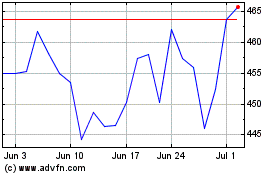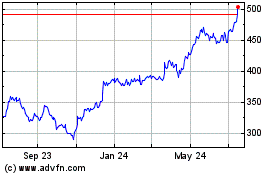Banks Stand to Lose More Than $100 Million on Loan to Chairman of China's Luckin Coffee--Update
April 06 2020 - 2:22PM
Dow Jones News
By Jing Yang
Banks stand to lose more than $100 million from a loan they made
to the chairman of Luckin Coffee Inc., whose share price plunged
after the Chinese coffee chain last week said much of its 2019
sales were fabricated.
On Monday, Goldman Sachs Group Inc. said an entity controlled by
Luckin Chairman Charles Zhengyao Lu defaulted on a $518 million
margin loan facility. It said a group of lenders is putting 76.3
million of the Chinese company's American depositary shares --
representing the collateral for the loan -- up for sale.
Goldman said it is acting as a "disposal agent" for the lenders,
meaning it is helping to facilitate the share sale in one or more
transactions. The identities of the lenders wasn't disclosed, and a
Goldman spokeswoman declined to say if the investment bank was
among them.
The securities pledged toward the loan are held by Mr. Lu and
Jenny Zhiya Qian, Luckin's chief executive officer. The two are
co-founders of the company, which had quickly emerged as a rival to
Starbucks Corp. in China. The pledged shares were recently worth
about $410 million, based on Luckin's closing price of $5.38 per
American depositary share on Friday.
The Nasdaq-listed shares sank further Monday, falling 15% to
$4.58 in early trading, giving Luckin a market capitalization of
about $1.1 billion.
A spokesman for Luckin declined to comment.
The embattled company, which is based in Xiamen, China, stunned
investors on Thursday by disclosing that as much as 2.2 billion
yuan ($310 million) in sales from the second quarter to the fourth
quarter of last year were fabricated by some employees. It has
suspended its chief operating officer and several staffers.
The falsified sales represented close to half of Luckin's
reported or projected revenue for the nine-month period. Luckin's
U.S. shares, which were trading above $26 prior to the news, lost
nearly 80% of their value in two days last week.
The forced sale of the Luckin shares, which is the result of a
margin call, shows how badly the banks were blindsided by the
company's recent revelations.
Lenders typically build in a large cushion between the size of
their loan and the value of the collateral securing it, to protect
themselves from market price declines. At the end of 2019, when
Luckin's U.S. shares were trading at about $39 apiece, the
collateral backing the $518 million loan was worth about $3
billion.
The margin-loan default could be one of a string of similar
defaults by other Luckin shareholders. The company's management and
their family members have pledged other shares as collateral for
borrowings, according to a prospectus filed in January. More forced
sales could weigh on Luckin's stock price and lead to more margin
calls and loan defaults.
As of January, Mr. Lu controlled about 36.8% of the company's
shareholder voting rights, while Ms. Qian had 23.7% of the voting
rights. Goldman said Monday that even if all the shares backing the
$518 million margin loan are sold, Mr. Lu's voting interest in the
company wouldn't decrease, but Ms. Qian's would decline
significantly. The company has two classes of shares with different
voting rights.
From its founding in 2017, Luckin took less than 18 months to
achieve a Nasdaq initial public offering, one of the fastest
ascensions by a startup globally. The company raised more than $2
billion from private and public investors and opened more than
4,500 stores across China, overtaking Starbucks in the country by
the end of 2019.
Some of the world's largest investors were drawn in by the
company's rapid growth and business model of wooing customers with
coupons and deliveries of freshly brewed coffee made from what
Luckin said were premium Arabica coffee beans.
Credit Suisse AG's Singapore branch is the trustee holding the
Luckin shares on behalf of the lenders looking to sell. The Swiss
bank was also the lead bookrunner of Luckin's IPO and helped the
company raise additional funds from investors in a follow-on share
offering and a sale of convertible bonds in January. A Credit
Suisse spokesman declined to comment.
Write to Jing Yang at Jing.Yang@wsj.com
(END) Dow Jones Newswires
April 06, 2020 14:07 ET (18:07 GMT)
Copyright (c) 2020 Dow Jones & Company, Inc.
Goldman Sachs (NYSE:GS)
Historical Stock Chart
From Mar 2024 to Apr 2024

Goldman Sachs (NYSE:GS)
Historical Stock Chart
From Apr 2023 to Apr 2024
